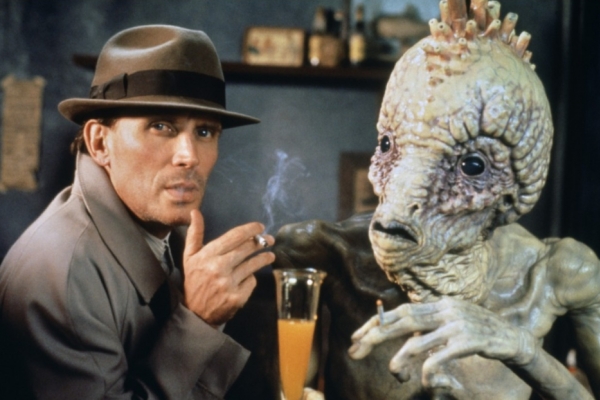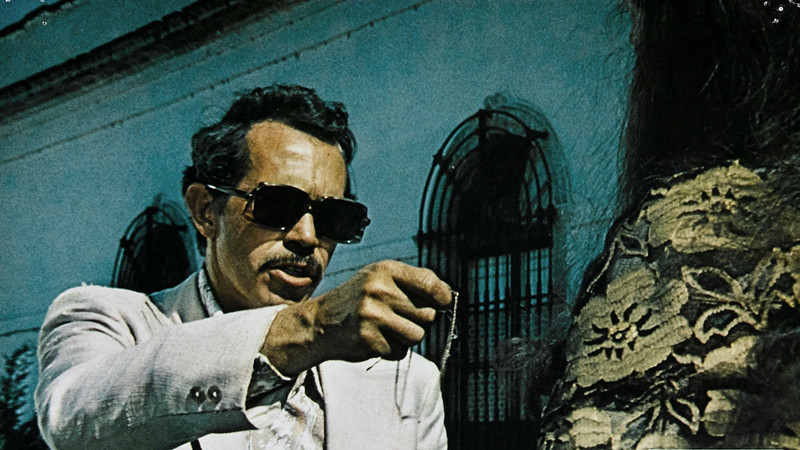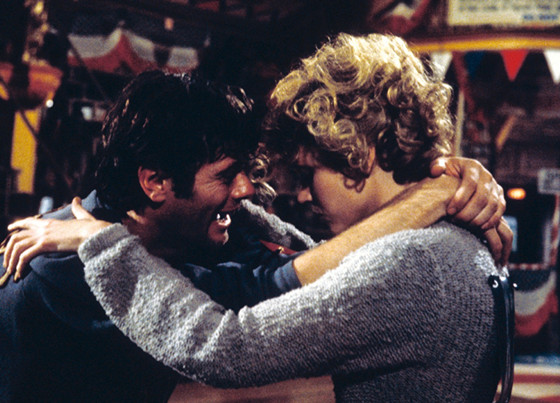5. Naked Lunch (1991)

There’s an episode of “The Simpsons” where Bart gets a fake drivers license and takes his friends on a road trip across the country. During the trip, the underage boys go see David Cronenberg’s “Naked Lunch,” solely because of the title and that it’s an adult film. Upon leaving the theatre one of the boys, Nelson looks up at the title on the marquee and says “I can think of at least two things wrong with that title.”
Based, not only on William S. Burroughs’ novel of the same name but also on the author’s life as well as other works by him, “Naked Lunch” is a mixture of everything Cronenberg is known for and then some. Possibly one of the weirdest films ever made with a plot that’s hard to sum up, other than it involves an addiction to bug powder that leads to a crazy high that no other drug in the world could possibly match. The title is even harder to explain.
In the introduction of his book, Burroughs writes, “The title means exactly what the words say: naked lunch, a frozen moment when everyone sees what is on the end of every fork.” Whatever that means, it’s a great title to a great film that’s as unique and unforgettable as its film.
4. Eternal Sunshine of the Spotless Mind (2004)

“
How happy is the blameless vestal’s lot?
The world forgetting, by the world forget:
Eternal sunshine of the spotless mind!
Each prayer accepted, and each wish resigned;
”
It’s commonly said to be wise to give your film a short and memorable title. Something catchy that sums up your film in a few easy words. “Eternal Sunshine of the Spotless Mind” does none of these things except being undoubtedly one of the most poetic and memorable film titles to come along in the last couple of years, if not ever.
Initially naming his script with an 18-word title, Kaufman eventually settled on a line taken from the influential 1717 poem by Alexander Pope called “Eloisa to Abelard.” The poem focuses on themes of love and memory between two people over the years. The “Eternal Sunshine of the Spotless Mind” line from the poem is a metaphor that points to the happiness and content one feels after dealing with the negative experiences of pain.
By choosing to erase and forget the pain caused by their relationship with each other, the two characters at the center of the story unknowingly choose to be forever stuck in a pattern of their mistakes and can never truly learn from them or find peace. It’s the perfect title that sums up the themes of the film beautifully.
3. Bring Me the Head of Alfredo Garcia (1974)

There’s something special about the simplicity of a film title that also makes a statement about what exactly the story is about. “The Assassination of Jesse James by the Coward Robert Ford” and “No Country for Old Men” are examples of recent films that make bold and unforgettable statements.
While those aforementioned titles keep building to an ending that puts their titles in context, Sam Peckinpah’s neo-western action film does the complete opposite. Yes, Peckinpah’s trademark violence and grit are present, but there’s an inherent love story in-between all of the mayhem.
“Bring Me the Head of Alfredo Garcia” wastes little to no time in kicking the plot into gear. In the opening minutes, an angry Mexican mob boss bellows out, “Bring me the head of Alfredo Garcia” after finding out the identity of the man who impregnated his teenage daughter. Pretty soon the hunt is on. To say more would ruin the many surprises the film has in store, but Alfredo Garcia’s literal head plays both a large and inconsequential role.
Aside from having a cool, simple, and unforgettable title that most action films would kill for, the actual story flips whatever preconceived notions the title may’ve given you going in. It’s a title whose story basically writes itself, with screenwriter Frank Kowalski doing exactly that by coming up with the title first and then presenting it to Peckinpah.
2. Dr. Strangelove or: How I Learned to Stop Worrying and Love the Bomb (1964)

Stanley Kubrick’s classic satire tells you what to expect from the film with the bonkers title alone. And that’s to expect complete insanity. In a film that features the iconic image of a commander riding a bomb as it drops to the earth like he’s riding a mechanical bull, the title fits perfectly.
Commonly known just as “Dr, Strangelove” (because who has the time or energy to say the full title), the black comedy satirizes the Cold War where fear and paranoia run amok from one hilarious yet scary scenario to the next. With the legendary Peter Sellers taking on not one, not two but three distinct characters, including the titular Dr. Strangelove, the film is filled with characters with insane names such as General Jack D. Ripper, Colonel Bat Guano, and Major T.J. “King” Kong (played by “Slim Pickens”), to name a few.
Legendary stand-up comedian George Carlin once did a bit in one of his career-best specials “Jammin’ in New York” about how war is the result of the men in power feeling insecure about their manhood, which explains why all the shapes of weapons and bombs are shaped like giant penises. This not only explains the title and the character name “Dr. Strangelove,” but also the underlying theme of sexual repression throughout the film.
1. They Shoot Horses, Don’t They? (1969)

No other medium has influenced pop culture as much as cinema from the endlessly quotable lines of dialogue, fashion, and visual imagery. When it comes down to film titles, no other film has been embedded in the culture like Sydney Pollack’s Depression-era drama.
Based on the Horace McCoy’s novel of the same name, “They Shoot Horses, Don’t They?” follows a dance marathon in 1932. Taking place over weeks, the dance marathons that were prevalent during the era gave contestants a chance at glory and some money in their pocket in a time when both things were hard to come by. People were willing to do just about anything to make ends meet or win in a competition that was ready to exploit them in the name of entertainment.
The true genius of the title comes with comparing the suffering of animals with that of humans. In the days before veterinary science could heal the leg of a broken horse, the only way to end the suffering of the animal would be to shoot it to end its misery. How would one end the suffering of a human?
Ironically the title of McCoy’s novel and its film adaptation has taken different meanings over the years and can be equated to fit many situations. The title fits perfectly into the film’s themes and unforgettable ending by answering a question before asking it. An instantly unforgettable title if there ever was one.